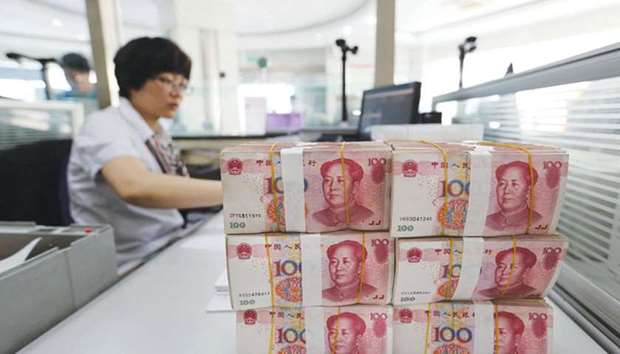Two years after Chinese policy makers devalued the yuan, an act that torpedoed global markets, traders are starting to view the currency as a sure bet.
The yuan has surged 3.9% to be the best performer in Asia this quarter, while momentum indicators are near the highest since 2005.
Typical risk-off events seem only to heighten demand for the exchange rate, making it act like a haven. North Korea firing a missile? Buy the yuan. Dysfunction in the White House? Buy the yuan.
The currency’s recent favour among traders is being helped by several factors, most notably the slumping dollar. Japan’s vulnerability to North Korean missiles is also prompting a search for an alternative haven to the yen.
Domestically, capital controls have curbed outflows, lessening pressure on the yuan to depreciate, while a buoyant stock market is luring inflows. There is also a perception that officials will keep the currency elevated before a Communist Party meeting next month.
Risks remain for the currency, which has blown past analyst targets for this year. Its rally has yet to be tested by a sustained rebound in the greenback, with the Bloomberg Dollar Spot Index trading near its lowest level since early 2015. Betting on China’s powers of financial market levitation hasn’t always worked out well in the past, while the country’s position as North Korea’s ally means it’s at risk of sanctions.
“There’s talk of the yuan as a safe haven because investors have come around to the view that the People’s Bank won’t let it slide,” said Mark Williams, chief Asia economist at Capital Economics in London. “But the picture could change if President Trump introduced wide-ranging trade sanctions on China or if something caused the US dollar to strengthen abruptly.”
For now, at least, the yuan has a number of things going for it.
The People’s Bank of China has tightened funding conditions this year while the Federal Reserve has signalled a cautious approach to further rate hikes, contributing to China’s widening yield advantage.
Then there’s the reversal in the so-called Trump trade as investors unwound bets on an ambitious growth agenda centred around major tax reforms and infrastructure spending.
“The yuan has found support from an unexpected source: President Donald Trump,” Bloomberg Intelligence analysts Fielding Chen and Tom Orlik wrote in a note. “Political turmoil in the US has dented the dollar.”
China’s economic data have also held steady, and the People’s Bank of China’s fixings have signalled a preference for a stronger exchange rate ahead of next month’s Party Congress. And while Donald Trump outlined plans for new sanctions that could target China, investors remain unconvinced he will actually take action.
If the US restricts trade with China, “all that’s really going to happen is for those products which you can’t substitute locally, the prices are going to go up, so it’s going to be inflationary for the consumers inside the US,” said Hayden Briscoe, head of Asia Pacific fixed income at UBS Asset Management in Hong Kong.
Of course, because of China’s massive current-account surplus, foreign-exchange reserves and capital controls, the yuan has always been steadier than most emerging-market currencies. Still, tight state control is a double-edged sword: the yuan is far from being a haven in the classic sense, as it’s much easier to put your money in freely-traded haven currencies like the yen.
“The yuan may be less vulnerable than some other emerging market currencies at times of heightened global risks,” Louis Kuijs, head of Asia economics at Oxford Economics in Hong Kong, wrote in an e-mail. “However, I do not have the impression that the yuan is a ‘haven’ currency like the Japanese yen.”
Markets are starting to show jitters over the yuan’s outlook as well. One-month implied volatility, which is used to price options, jumped to the highest since February on Tuesday, while the offshore yuan snapped a record 14-day run of appreciation.
The onshore rate fluctuated between gains and losses yesterday. It was up 0.1% in Shanghai.
While it remains to be seen whether the yuan can hold this quarter’s gain, its strength has forced banks including Standard Chartered, Credit Agricole CIB and Mizuho Bank to increase their forecasts for its 2017 performance.
“The renminbi is strong because of the strong Chinese economy and a weaker dollar,” said Shen Jianguang, chief Asia economist at Mizuho Securities Asia.

Yuan banknotes are placed on a staff’s table in a bank in Lianyungang, China. The yuan has surged 3.9% to be the best performer in Asia this quarter, while momentum indicators are near the highest since 2005.
